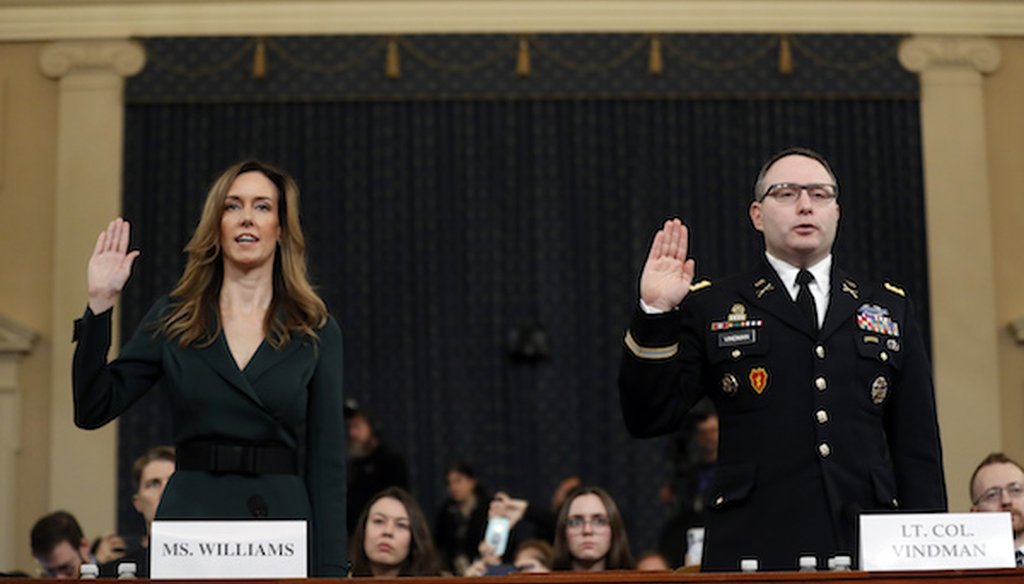Stand up for the facts!
Our only agenda is to publish the truth so you can be an informed participant in democracy.
We need your help.
I would like to contribute

Jennifer Williams, an aide to Vice President Mike Pence, left, and National Security Council aide Lt. Col. Alexander Vindman, are sworn in to testify before the House Intelligence Committee. (AP)
Army Lt. Col. Alexander S. Vindman is a career officer whose father left Ukraine and brought him to the United States when Vindman was four years old. Vindman is responsible for Ukraine policy on the National Security Council, and he was in the White House Situation Room listening to the July 25 call between President Donald Trump and Ukraine President Volodymyr Zelenski.
That call, of course, triggered the whistleblower report, which in turn led to the House impeachment inquiry.
Based on his Oct. 29 Intelligence Committee deposition, Vindman — who testifies publicly Nov. 19 — is likely to share what he knows about U.S-Ukraine dealings leading up to and then after the Trump-Zelensky phone call.
A bit about Vindman
After Vindman’s mother died, his father left Kyiv with him, his twin brother and an older brother. In 1979, they arrived in New York. Vindman was 4 years old. He and his twin went to college through the Reserve Officers Training Corps.
Vindman and his brother are career Army officers, and both rose to become lieutenant colonels. His brother worked alongside him on the National Security Council.
Vindman served in South Korea, Germany and Iraq. In 2004, he was awarded the Purple Heart after being wounded by a roadside bomb. He is fluent in Ukrainian.
According to the U.S. Army, he has served for more than 20 years. In addition to the Purple Heart, his medals include two Defense Meritorious Service awards, and an Army Commendation Medal — more than 10 in total.
On the National Security Council, Vindmand reported to Fiona Hill, who in turn reported to John Bolton, Trump’s then-National Security Adviser. Vindman listened to the Trump-Zelensky call from the White House Situation Room, along with other security officials and members of the vice president’s staff.
Concerns about Sondland and Giuliani
In closed-door testimony, Vindman told House members about a July 10 White House meeting between Ukraine’s defense secretary and American officials. When the Ukrainians brought up their desire for a meeting between Trump and Zelensky, Sondland started talking about Ukraine pursuing certain investigations.
Afterwards, as drawn from his deposition transcript, Vindman said he and Hill met with Sondland.
"There was a scheduled debriefing during which Ambassador Sondland emphasized the importance that Ukraine deliver the investigation into the 2016 elections, the Bidens, and Burisma. I stated to Ambassador Sondland that his statements were inappropriate, that the request to investigate the Bidens and his son had nothing to do with national security, and that such investigations were not something that the NSC was going to get involved in or push. Dr. Hill entered the room shortly thereafter and asserted to Ambassador Sondland that his statements were inappropriate."
Vindman also described Guiliani’s efforts to sabotage the reputation of U.S. Ambassador to Ukraine Marie Yovanovitch and advance the debunked notion that Ukraine interfered with the 2016 presidential election.
He said Ukrainian officials told him they were uneasy with Giuliani’s attempts to get them to open investigations.
Key departments argued for the release of the military assistance package
Vindman said representatives from the State, Defense and Treasury departments, and the intelligence community met with some urgency on July 26, the day after Trump’s call with Zelensky.
They all supported releasing military aid to Ukraine. Vindman said the group was concerned that if the Russians learned about the hold, it would "signal to the Russians that they could potentially be more aggressive."
He also tracked the order to hold the aid back to Acting White House Chief of Staff Mick Mulvaney, despite the fact that the Defense Department had signed off on the release of military aid.
Vindman noted that to make sure dollars are spent as they should be, federal law requires that "the Department of Defense has to certify in order to release those funds, and they had consistently provided the certification to release those funds."
Missing words in the phone memo
Vindman said the memorandum released by the White House differed from his notes of the call in a couple of ways. Most notable was Zelensky’s reference to the Burisma energy company that had paid Hunter Biden to sit on its board at a time when Joe Biden was vice president.
The White House version has Zelensky saying a new prosecutor "will look into the situation, specifically to the company that you mentioned."
Vindman said his notes had Zelensky saying "Burisma" where the memo had "the company."
So, the more accurate version would have been that a new prosecutor "will look into the situation, specifically to Bursima that you mentioned."
Our Sources
U.S. House Intelligence Committee, Vindman full testimony, Oct. 29, 2019
U.S. House Intelligence Committee, Vindman excerpts, Oct. 29, 2019
PolitiFact, Read the declassified whistleblower complaint on Ukraine, Biden and Trump, Sept. 26, 2019
PolitiFact, The readout of Donald Trump's call with Ukrainian President Volodymyr Zelensky, Sept. 26, 2019
Federal Register, Organization of the National Security Council, April 4, 2017




















































